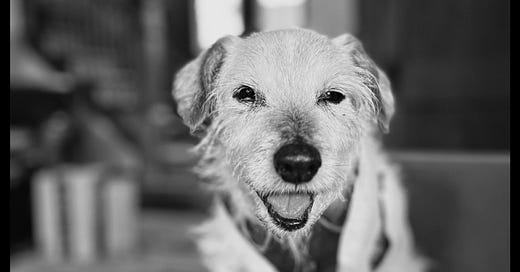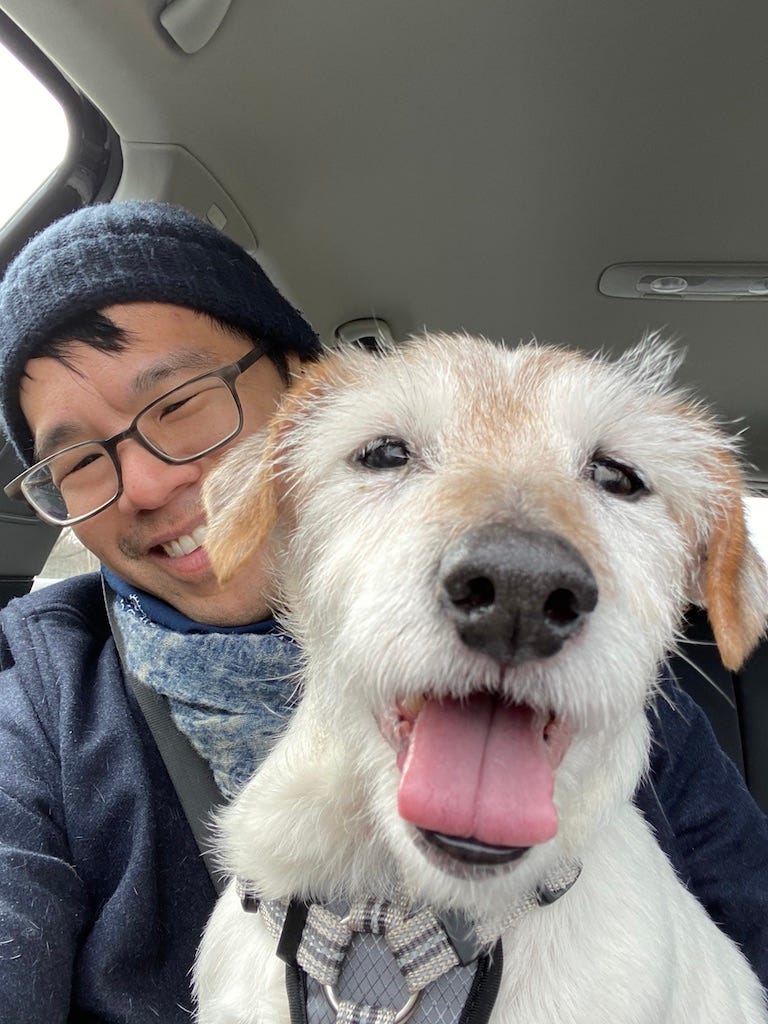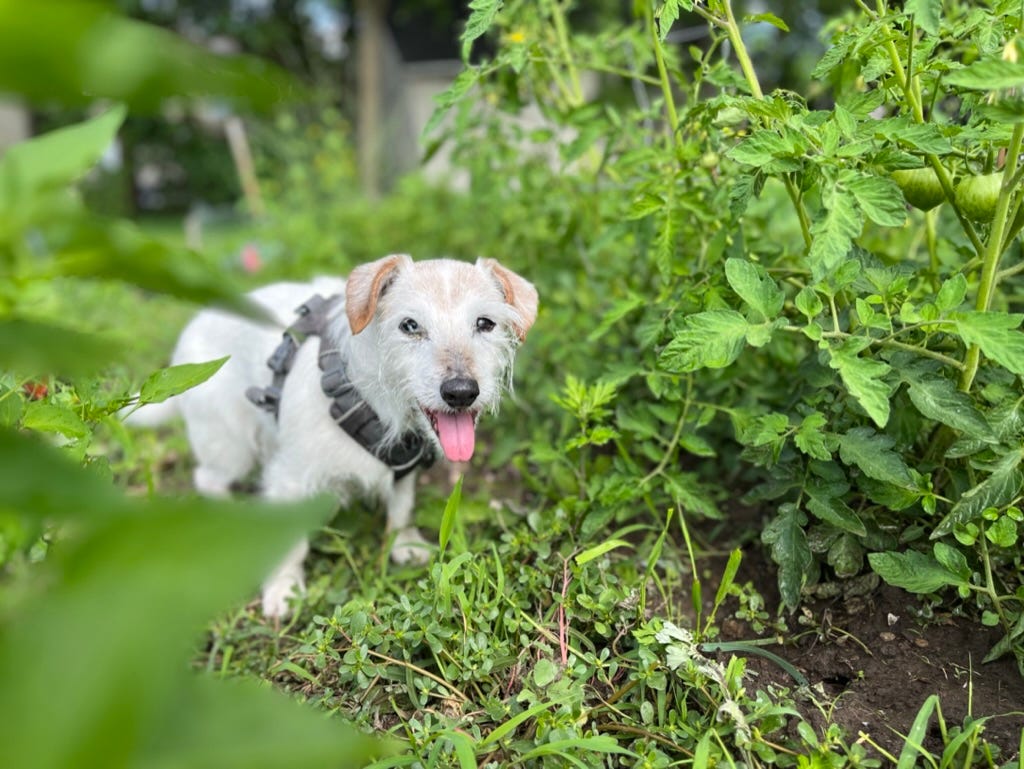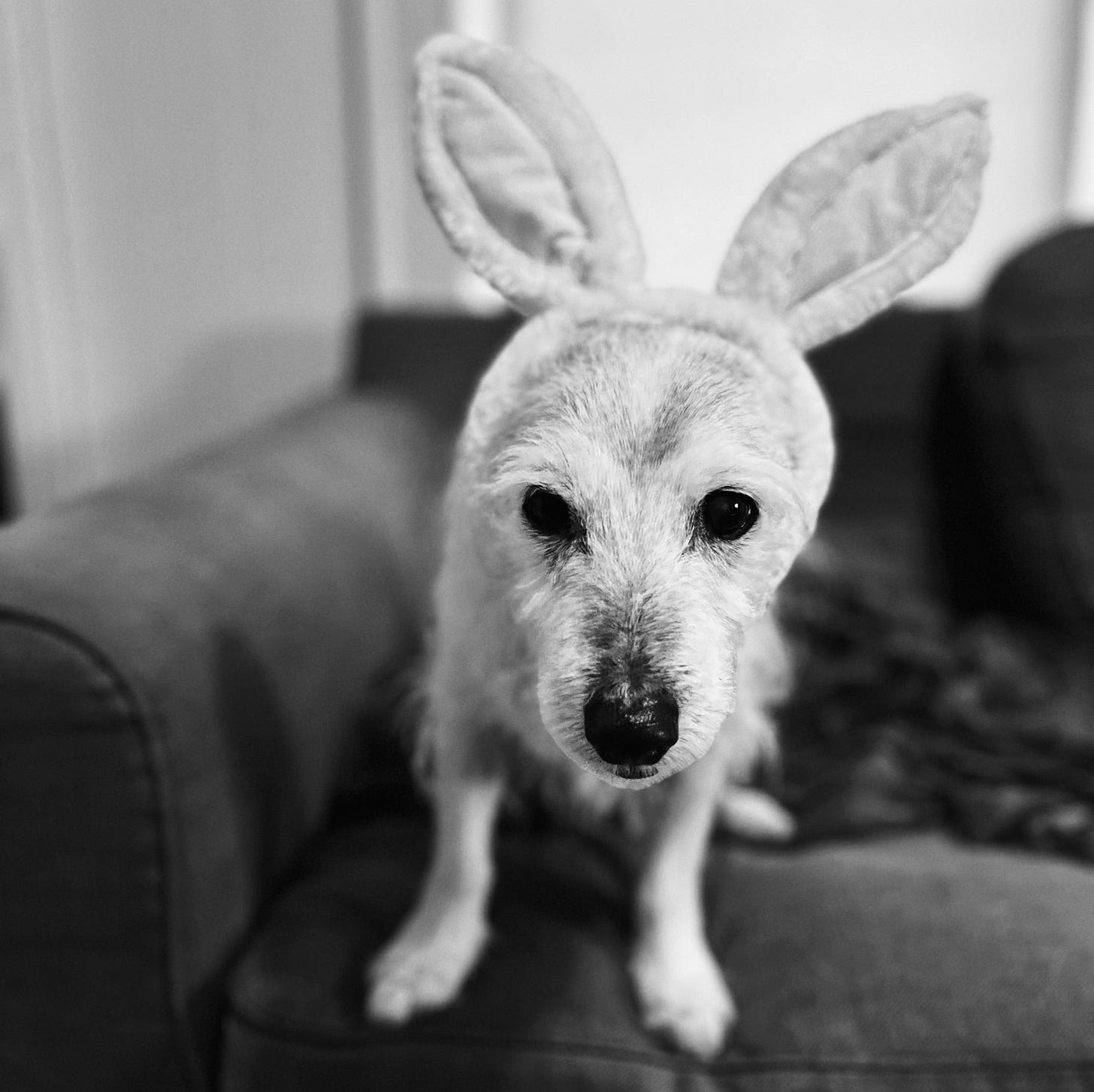Tuesday, June 11
Grand Rapids, Mich.
Fozzie died on Friday afternoon.
We knew it would happen at some point. He was already old when he came to live with us in April 2020. How old, we’ll never know, but the shelter guesstimated “somewhere between eight and twelve.”
His life hadn’t been easy. Again, we got few specifics. His body told some of the story, though: He was almost entirely deaf, likely because of his chronic ear infections, and he was an itchy mess, with severe skin problems as well as a thyroid condition. With a better diet, medicinal baths, and the help of an incredibly patient vet, we took care of much of that. Over the past year, though, his back legs started to fail, we saw signs of dementia, and his trachea began to collapse.
But I’d much rather remember how Fozzie lived than how he died:
How he took such joy in chasing rabbits.
How he erupted into fury at the cats across the street, especially the one that had the audacity to pee on our front porch.
How he loathed the huskies down the block, gurgling in his obviously righteous rage.
How he adored pasta and bread—so much so that he once dug a stale crust out from under a snowbank and then looked at us in triumph.
How he seemed unaccustomed, even averse, to affection, but every once in a long while, would fall asleep on Tristan’s lap.
How he hovered next to me in the community garden.
How he always did a series of spins in his bed before settling.
How he could lick a cutting board on which I had sliced a steak for a good and happy half-hour, until it was spotless.
How he flopped for belly rubs, and devoured treats, and ran on the beach with his friend Stoffels.
--
Fozzie came to live with us just four months after we arrived in Grand Rapids. We moved here in late January, and not two months later, the pandemic lockdown began. Somehow, like so many other people, I ended up on Petfinder, where a shelter in Indiana had listed the Fozz.
He had been at the shelter for months and months. It baffles me that nobody wanted him. He was adorable, with piercing, dark eyes topped by lavish eyebrows.
When we met him, Fozz seemed wary, sniffing us cautiously before wandering away. We weren’t sure either. Though Tristan and I had both grown up with dogs, we’d never had one together. So we didn’t say “yes” right away; it was more of a “maybe”: We thought about it for a week, and then we agreed to foster him for a month.

When we returned to Indiana to pick him up, it felt as if the lady at the shelter couldn’t get us out the door fast enough. She thrust a bag of food and a bed and toys that Fozzie never played with into our arms, along with that sixteen-pound dog.
Tristan drove us back to Michigan, Fozzie on my lap. The picture we took on the ride home is still one of my favorites. I knew even then that it was almost inevitable that this would turn out to be a foster fail.
Of course we never took him back to the shelter. Of course he wove himself into our lives, not least because he seemed to channel the bulk of his energy into producing more and more hair, which he shed all over our house. Of course Fozzie became a part of our family.
--
There is so much sorrow in the world today.
Perhaps this is how it has always been, except that we can see things more immediately now. Because all the griefs of the world are so much more evident, so easily accessible, the temptation to rank those griefs is also more present. That is a temptation I wish to resist. A grief can be different—more personal, more particular, more acute—without being “more than” or “less than.”
The same, I think, is true of love. And maybe all these shades of grief are no bad thing, because they remind us of the multivalence of love.
A few years ago, the singer Nick Cave got a letter from a fan named Cynthia, but it wasn’t about his music; it was about grief. Cave’s 15-year-old son Arthur had died, and Cynthia was asking about the aftermath of Arthur’s death.
“It seems to me that if we love, we grieve. That’s the deal. That’s the pact,” Cave wrote. “Grief and love are forever intertwined. Grief is the terrible reminder of the depths of our love and, like love, grief is non-negotiable.”
I am more familiar with grief than I’d like to be. As with love, every single experience of grief has its own particular contours. It is never the same twice, nor would I want it to become too familiar. If anyone says that they have mastered grief, then I will show you someone who has grown calluses over their heart. Nobody can or should grow so accustomed to sorrow; that would be a tragedy.
There is a little part of me that feels ridiculous to hold such deep grief about a dog. But while I have lost other beloveds, I’ve never had to say goodbye to anyone whose days and nights were quite so interwoven with mine. Especially in Fozzie’s last months, we molded our schedules to his. One sign of canine dementia is that they lose their sense of time and space. Some nights, he’d wake and yelp for us, and not even because he needed to go out; he had just forgotten where we were.
Of course I know that, in time, we will find our new normal. Right now, though, it is all too fresh. A sympathy card comes. I try to read it aloud to Tristan, but one and a half sentences in, I have to stop.
--
Early Sunday morning—probably about 3:30 a.m.—I woke with a start. Was that Fozzie’s whimper that I heard? Almost as quickly as I thought it, I knew that it was not, and then I was sad again.
That afternoon, the sky was pure blue and the air not too warm, so I headed to the community garden. Roger, who tends the next plot to the north, asked me where my little friend was. “He died on Friday,” I said. A conversation stopper for sure.
I weeded a bit, and I checked the potatoes for beetles. I planted one row of black beans as well as some zinnias and cosmos. But then I left. Fozzie was alongside me all four previous seasons I’ve gardened there. He was there last month when I planted the potatoes, and ten days ago, when I nestled this year’s tomato and pepper seedlings into the soil. I don’t want to be in the garden without him. I don’t yet know how to be there without him.
In her book Dog Songs, Mary Oliver returned to the theme of a beloved pet’s death multiple times. “Bazougey” might be the poem that moves me most, especially this beginning:
Where goes he now, that dark little dog
who used to come down the road barking and shining?
He’s gone now, from the world of particulars,
the singular, the visible.
So, that deepest sting: sorrow. Still,
is he gone from us entirely, or is he
a part of that other world, everywhere?
Maybe there’s a third way: I don’t think Fozzie is gone from us entirely. Of course he is in our memories. We have a framed picture of him amidst our family photos. And even now, when I look at my jeans, or at the rug in my study, I see the ubiquitous white Fozzie hairs. Given his relentless shedding and how we find his hair everywhere, I’ve always thought that his favorite Bible verse was one that he appropriated for his own purposes: “Lo, I am with you always, even to the end of the age.”
Still, what I wouldn’t give to snuggle with him one more time until, on cue, he’d wriggle away, as if the affection were somehow unseemly, and trot off to the kitchen in search of a treat.
--
Fozzie is still with me in one other way: He grew my heart.
Fozzie could be extremely annoying at times, scampering to the door for yet another walk not five minutes after we’d returned from one. We’d be exasperated, of course, but we rarely denied him. There wasn’t much point yelling at him; he couldn’t hear us anyway. So out we went—eight, nine, ten times a day.
You could fairly argue that we were soft, that we could have and maybe should have tried harder to train him, that we shouldn’t have let the Fozz boss us around like that. Those things are probably all true, but this is truer: We loved him unconditionally.
I know how to love more than I did before, thanks to Fozzie. I don’t like to admit that. It would be easier and much more convenient not to acknowledge it. But that would also be a lie.
Caring for Fozzie taught me that I was more capable of a patient and gentle love, love that pays attention, love that acts in specificity, than I realized. I have to hope that love can still be nurtured, even expanded—that it wasn’t limited to a single ancient Jack Russell mix with a mysterious backstory, that it might go out and be good news, that it might bless other creatures (maybe even people!) in other places and spaces.
The heart that Fozzie helped grow? I want to believe that it won’t now shrink.
Thanks to the many of you who have loved the Fozz from afar. It has been a comfort to know that he brought delight to so many. Keep us in your prayers.
In gratitude and with hope,
Jeff









Farewell to your dear Fozzie. Thank you for sharing him with us. I worry that it won’t be much longer until our dear Moo (another Jack Russell cross) joins him in the next life. (Because of course there will be dogs in heaven!). Our boy is 15, going deaf and blind and confused. Wants to go out, and wants to come home. Is too tired to walk far, but loves being carried.
They are good gifts from God, our sweet and bossy dogs.
Sending you and Tristan my love and sympathy in your loss.
Louise
Grateful for all these expressions of solidarity and care, and especially for the stories of your own dogs. So much love, so much loss, so much goodness, so much sorrow—yet more reminders of the beauty and fragility of life.